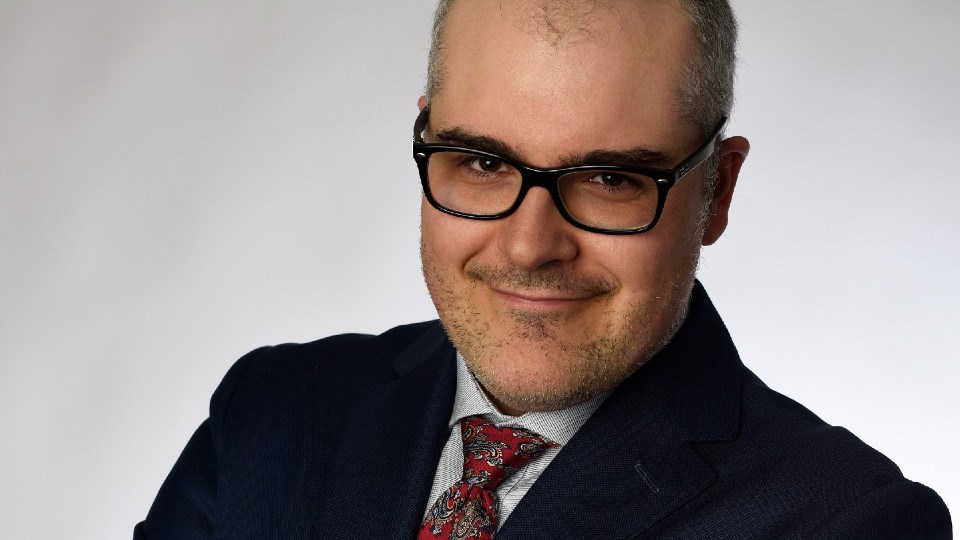On the walls of Serge Miville’s office at the University of Sudbury, there hangs the history of the first, and for many years, the only higher learning institution in Northern Ontario.
Founded as Collège du Sacré-Coeur in 1913, it changed its name to University of Sudbury in 1957 and began to exercise full teaching and degree-granting powers. It entered into the Laurentian Federation as a founding member in 1960.
But the federation fell apart in February of 2021, after Laurentian University filed for insolvency and entered into the The Companies' Creditors Arrangement Act (CCAA).
With Laurentian University’s decision to cut ties with the federated universities operating on campus, the University of Sudbury announced it was becoming an autonomous French-language university under the principle of governance “par, pour et avec,” (french for by, for and with) the Francophone community.
Then, in September of last year, the Board of Regents of the University of Sudbury unanimously passed a resolution to transform the institution into a university governed by and for Francophones.
The classrooms at the University of Sudbury — not to mention at the two other federated universities on LU’s campus, Thorneloe University and Huntington University — remain empty for now as a result of Laurentian’s actions.
But that means there is time to rebuild, and to build back better.
“I think it's really exciting because I feel like we're on the cusp of an important shift within the university network, especially for the French language,” Serge Miville, University of Sudbury president, told Sudbury.com. “We're going to be able to position ourselves in a very interesting way. We get to sort of take stock of what's needed to do things properly.”
Miville said it may mean a shift in timelines for the reopening of the university, and certainly a great deal of “homework” he said, “but afterwards, it's going to put us in a much better position, because then we'll be able to make decisions based on facts. And that's always better than shooting in the dark.”
Those facts are coming to light as part of the PEQAB assessment the University is undergoing.
The Postsecondary Education Quality Assessment Board (PEQAB) is an advisory agency of the Government of Ontario. It makes recommendations to the Minister of Colleges and Universities (currently Jill Dunlop, Simcoe North MPP), on applications for schools wishing to offer all or part of a degree program or designate themselves as a university.
“We don’t want students to be in an institution that can't actually deliver on the quality of education that's expected in Ontario,” said Miville, and said the exercise will only help in rebuilding the institution. “There's so many things, academic policies, for example, which were embedded with Laurentian’s, because of the Federation. so through that disentanglement process, we had to build our own, that's pretty normal. Every institution has their own academic policies, which does allow us to sort of bring forward the best in the business basically. So we're able to look at what's happening elsewhere, and try to put in best practices there.
Miville said it is also a chance to bring a new policy of “active listening” within all their consultation processes. He said there will be community consultation committees dedicated to the opinions of stakeholders, and allow the university to make decisions both on data and feedback. These consultations will be held on a systematic basis, said Miville.
“We're trying to find ways to innovate the quality assurance process in the university sector, because we know that quality is going to be something that's excessively important for students, and it's something one take pride in,” he said.
Miville said the PEQAB process will ensure this consultation takes place. And with the $1.9 million recently pledged to them by the provincial government in order to facilitate the process.
They (the government) were sufficiently convinced about the well-founded nature of our request,” said Miville. He said that it was the funding needed to prepare the PEQAB and to take those first few steps, with follow up from the government after.
“The province has been pretty clear, do the PEQAB, do market research to see what the needs for French-language students and their university education are, and build the business plan accordingly.
That is what they are looking to do now. A Request for Proposal (RFP) will be issued soon for a company suited to creating the business plan.
And though the hope for the future is bright, Miville is plain about the issues still in place, especially in the wake of Laurentian University's program closures and staff layoffs.
“There are obviously issues: there was an exodus of students, and the economy took a hit – I don't think we've fully taken stock of the hit to the local economy – but, definitely with the amount of jobs that were lost and amount of students that are in lost, we're going to feel that for some time,” he said. But Miville isn’t a little worried, but not overly. “We're working towards trying to fix that, we're trying to turn that around and understand how we can build something that’s sustainable, high quality, exciting; something that’s going to attract people, that’s going to contribute positively into social, economic, and cultural development.”
And though the timeline for reopening the university is unclear, Miville is excited at the opportunity to reinvigorate the school, even if it is not quite what he needed. “I think down the line, it’s all going to be something very positive once the U of S is back on its feet.”
Jenny Lamothe is a reporter with Sudbury.com. She covers the diverse communities of Sudbury, especially the vulnerable or marginalized, including the Black, Indigenous, newcomer and Francophone communities, as well as 2SLGBTQ+ and issues of the downtown core.
